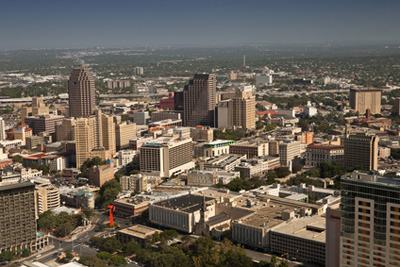Study: Best Cities for Urban Homesteading
Cities across the nation are witnessing a resurgence in the art of homesteading. From rooftop beehives in New York to organic farms transforming Detroit's vacant lots, urbanites are finding creative ways to make their own sustainable food system.
Not only is freshly grown produce from your own yard much healthier than what you’ll find in the grocery store, you can also save money, particularly on organically grown items. Depending on how enthusiastic you are about urban homesteading (beyond vegetable gardens, some people are getting eggs on a daily basis from their own chickens), the practice can take some work when you first get started, but you could end up with an overflowing bounty to feed your family and friends. You could even turn a profit by starting your own stand at a local farmers market!
To increase your chances of establishing a successful urban homestead, we’ve researched the very best large cities in the country for urban homesteading.
Study Methodology
- Days in growing season
- Number of garden plots per 10,000 residents
- Legality of backyard chickens
- Legality of backyard bees
Growing your own fruit and vegetables is the easiest way to start your own urban homestead. Whether you’re growing tomatoes in a pot on your balcony or have a few raised beds in your backyard, Mother Nature will dictate when you can plant. Consequently, we looked at each city’s average number of days of growing season – that is, how long you have to plant from the date of winter’s last frost to the first frost of the following fall.
Next we looked at the number of community garden plots in each city to find those where anyone can easily find a spot to grow even if you’re an apartment dweller with no outdoor space.
Finally, we looked at the legality of keeping chickens and bees in your backyard. We ranked cities based on whether each one is legal without a permit, legal with a permit, or completely illegal. Be sure to check your local ordinances, because even if you don’t need a permit for hens or bees, there may be other restrictions, such as setbacks from property lines.
10 Best Cities for Urban Homesteading
 |
10. Sacramento, CA
 |
| Sacramento, California |
- Days in growing season: 296
- Number of garden plots per 10,000 residents: 5.7
- Backyard chickens legal?: Permit required
- Backyard bees legal?: Yes
Sacramento ties for last place in our study for best places to homestead. A community garden plot should be easy to come by, and you’ll be able to grow produce nearly 10 months out of the year. It’s legal to have a beehive in your backyard, so check out Sacramento Beekeeping Supplies on X Street, where you can pick up a beginner’s kit for under $200.
9. Portland, OR
 |
| Portland, Oregon |
- Days in growing season: 236
- Number of garden plots per 10,000 residents: 24
- Backyard chickens legal?: Yes
- Backyard bees legal?: Permit required
Portland is teeming with community gardens, so if you prefer apartment living, this is a great city to find space for that vegetable plot. With just a bit of paperwork, you can also have both chickens and bees. Feeling really adventurous? Pick up a few pygmy goats, which are allowed without a permit if you have no more than three. They’re no bigger than a large dog, and you can even take them for walks on a leash. The Portland Goat Justice League helps beginners learn the ropes of caring for these milk producers.
8. San Antonio, TX
 |
| San Antonio, Texas |
- Days in growing season: 270
- Number of garden plots per 10,000 residents: 0.1
- Backyard chickens legal?: Yes
- Backyard bees legal?: Yes
Though San Antonio has hot Texas summers, it is very possible to have a multi-season garden. A drip irrigation system helps those tomatoes weather the summer heat, and raised beds help fight against the clay-like soil. Consider adding a few chickens to your urban oasis, and compost their manure to further improve your soil quality.
7. Louisville, KY
 |
| Louisville, Kentucky |
- Days in growing season: 205
- Number of garden plots per 10,000 residents: 6.3
- Backyard chickens legal?: Yes
- Backyard bees legal?: Yes
Though Louisville is one of the cooler climates on our list, the city offers many advantages for the modern urban homesteader. You’ll find garden plots aplenty, and residents may keep both chickens and bees. Nervous about taking the first step in setting up your own hive? The Kentucky State Beekeepers Association has local chapters across the state, so you can find a class and lots of experts to assuage your fears.
6. Las Vegas, NV
 |
| Las Vegas, Nevada |
- Days in growing season: 281
- Number of garden plots per 10,000 residents: 1.3
- Backyard chickens legal?: Yes
- Backyard bees legal?: Yes
With a good growing season and a fair amount of garden plots, Las Vegas makes our list for urban homesteaders. Worried about that hot summer sun and the city’s restriction on water? Consider indoor hydroponic gardening, which uses water with nutrients rather than soil. Any extra space in your apartment can house a small herb garden with an Aerogarden machine, or you could rig up your own contraption. Las Vegas may even become home to a 50-acre hydroponic farm if the person behind the project gets enough funding.
5. San Jose, CA
 |
| San Jose, California |
- Days in growing season: 358
- Number of garden plots per 10,000 residents: 9.7
- Backyard chickens legal?: Yes
- Backyard bees legal?: Permit required
San Jose is subject to just a few weeks of frost each year and summers aren’t too extreme, making it an ideal location for a year-round backyard garden. If you’re a beginner, consider spending a few days as a volunteer at Veggielution Community Farm, which will get your hands in the dirt and show you how to start your own urban vegetable oasis.
4. Houston, TX
 |
| Houston, Texas |
- Days in growing season: 308
- Number of garden plots per 10,000 residents: 0.4
- Backyard chickens legal?: Yes
- Backyard bees legal?: Yes
While chickens are legal in Houston, current ordinances require a 100-foot setback from your neighbors’ properties. While that may not leave enough space for many residents to enjoy fresh eggs every day, the group Hens for Houston is working to lower the requirement so that more urbanites may benefit from backyard chickens. If you don’t have enough space, try asking a friend with a bigger yard to split the responsibility of keeping chickens, or find a nearby community garden willing to give you space for a coop. You could negotiate with an offer of manure to fertilize their plants.
3. Austin, TX
 |
| Austin, Texas |
- Days in growing season: 291
- Number of garden plots per 10,000 residents: 1.5
- Backyard chickens legal?: Yes
- Backyard bees legal?: Yes
The urban homesteading scene is alive and well in Austin. Similar to its other Texas counterparts, hot summer days in the garden can be combated with a few rain barrels and a smart irrigation system. Join the Austin Urban Beekeeping Meetup group, which hosts monthly meetings to discuss topical issues and also offers an annual Beekeeping 101 class. The most recent class hosted over 100 students, ensuring the honeybee population will thrive in Austin.
2. Riverside, CA
- Days in growing season: 365
- Number of garden plots per 10,000 residents: 0.2
- Backyard chickens legal?: Yes
- Backyard bees legal?: Yes
With a 365-day growing season and backyard livestock legal, Riverside comes in second for our best homesteading cities. The area is also home to some experts willing to share their expertise, including a Meetup group at the Protective Bunkers Survival Center in Lake Elsinore. The group offers events not only on emergency preparedness but also canning and other homesteading techniques.
1. San Francisco, CA
 |
| San Francisco, California |
- Days in growing season: 365
- Number of garden plots per 10,000 residents: 1.5
- Backyard chickens legal?: Yes
- Backyard bees legal?: Yes
San Francisco rounds out our list as the best city in the nation for urban homesteading. Livestock laws are very homestead-friendly and there are plenty of community gardens in case you don’t have any outdoor space to call your own. In fact, North Oakland is even home to the Institute of Urban Homesteading, which offers classes tailored to the city dweller: urban gardening, animal husbandry, kitchen skills, and more.
As we mentioned earlier, be sure to carefully check both your city ordinances and homeowners’ association before investing in any livestock for your backyard. You’ll also want to research the responsibilities and costs of providing a home for bees and chickens; while they certainly add a lot of value, start-up costs like coops and hive equipment can add up quickly. Need more ideas for nature-friendly cities? Check out our study on Best Outdoor Cities.
Sources:
- Growing Season: The Old Farmer’s Almanac
- Garden Plots: Trust for Public Land
- Chicken and Beekeeping Laws: Local city ordinances and Backyard Chickens
Lauren Ward is a research analyst at CreditDonkey, a credit card comparison and reviews website. Write to Lauren Ward at lauren@creditdonkey.com. Follow us on Twitter and Facebook for our latest posts.
Read Next:
